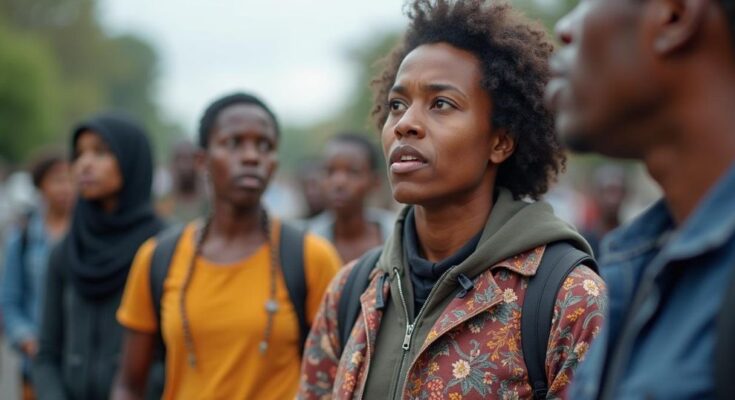In the Dominican Republic, escalating violence against human rights defenders advocating for migrants’ rights has surfaced, driven by discriminatory laws and a recent government decree on mass deportations. Prominent activists face intimidation and defamation amidst a climate of xenophobia, highlighting struggles faced by communities of Haitian descent. The situation calls for urgent protection measures to safeguard the rights of both defenders and marginalized populations.
In the Dominican Republic, a troubling wave of hostility toward human rights defenders and organizations advocating for migrant rights has surfaced, particularly since the anti-discrimination protests on September 23, 2024. This surge in violence is amplified by the looming shadow of Decision 168-13, which stripped generations of Dominicans of Haitian descent of their nationality. The underlying tensions have erupted since a recent governmental decree announced mass deportations, with plans to send thousands of Haitians back each week beginning October 4, 2024. In this charged environment, defenders of human rights, such as Wendy Osirus from MONDHA, and organizations like MOSCTHA, have faced frightening intimidation and physical threats. The violence has been exacerbated through online platforms where slanderous attacks proliferate, often led by those within their communities. Reports of racial profiling leading to the wrongful arrest of advocates, like Franklin Dinol, further underscore the dire nature of the situation. As the atmosphere darkens, stories of prominent figures emerge, such as Ana Belique, whose work with Reconoci.do aims to emancipate the rights of those marginalized by society’s prejudices. Despite her relentless efforts, she has found herself besieged by a barrage of vitriol online, questioning her identity and citizenship based on her appearance alone. On October 8, MOSCTHA’s office was a scene of chaos when members were verbally assaulted with anti-Haitian slurs, ushering an atmosphere of fear. Meanwhile, MUDHA’s tireless dedication to advocacy is met with online defamation that aim to dismantle their reputation. Each day, these brave souls rise against a tide of hatred, advocating for rights that should fundamentally belong to every human being, regardless of their lineage. The grim saga raises questions not just about the safety of these defenders, but about the integrity of a society grappling with deep-seated issues of racism and xenophobia. Burdened by a history of discrimination against individuals of Haitian descent, the plight of these communities and their staunch defenders seems perilously volatile. The very country that birthed them now stands at a crossroads, one that requires a reconsideration of values and the protection of humanity itself.
The Dominican Republic has faced significant tension regarding the rights of individuals of Haitian descent. Decision 168-13 from 2013 created a controversial legal environment by nullifying the nationality of several generations, plunging them into a state of statelessness. For over a decade, the repercussions have manifested in widespread discrimination, socio-economic marginalization, and increased vulnerability to violence and deportation. The recent governmental announcements regarding mass deportations have intensified fears among Haitian communities and those advocating for their rights, making the work of human rights defenders not just essential, but perilous. Their commitment to uphold dignity and rights in the face of hostility speaks volumes about their resilience and the critical need for attention to their plight.
In summary, the increasing violence and intimidation faced by human rights defenders and organizations in the Dominican Republic illustrate a dark chapter of racial discrimination and xenophobia facing people of Haitian descent. The challenges highlighted by individuals like Wendy Osirus, Ana Belique, and their respective organizations underscore the urgent need for protective measures from the government. Ensuring the safety of these advocates is crucial for the establishment of a just society where the rights of all individuals are respected and upheld, reflecting a collective commitment to human dignity.
Original Source: www.frontlinedefenders.org



